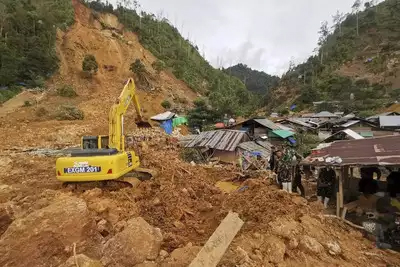More than 1,000 personnel, including army troops, have now been deployed in the search, said Edy Prakoso, the agency’s operation director
 KRC TIMES Desk
KRC TIMES Desk

PALU : Incessant rains Wednesday halted the search for 30 people believed trapped under a landslide that engulfed an unauthorized gold mine on Indonesia’s Sulawesi island over the weekend, killing at least 23 people.
More than 100 villagers were digging for grains of gold on Sunday in the remote and hilly village of Bone Bolango in Gorontalo province when tons of mud plunged down the surrounding hills and buried their makeshift camps.
The search was suspended Wednesday afternoon due to heavy rains, said Heriyanto, head of the provincial Search and Rescue Office. Rescuers have not yet been able to locate the missing people, he said.
The National Search and Rescue Agency said Wednesday that 92 villagers managed to escape from the landslide. Several of them were pulled out by rescuers, including 18 with injuries. It said 23 bodies were recovered, including that of a 4-year-old boy, while 30 people were missing.
More than 1,000 personnel, including army troops, have now been deployed in the search, said Edy Prakoso, the agency’s operation director. He said the Indonesian air force would send a helicopter to speed up the rescue operation, which has been hampered by heavy rains, unstable soil and rugged terrain.
Photos released by the agency showed an excavator removing tons of mud and rocks that blocked access to the site.
Informal mining operations are common in Indonesia, providing a tenuous livelihood for thousands laboring in conditions that pose a high risk of serious injury or death. Landslides, flooding and collapses of tunnels are just some of the hazards facing miners. Much of gold ore processing involves highly toxic mercury and cyanide with workers frequently using little or no protection.
The country’s last major mining-related accident occurred in April 2022, when a landslide crashed onto an illegal gold mine in North Sumatra’s Mandailing Natal district, killing 12 women who were looking for gold. Environmental activists have campaigned for years to shut down such operations across the country, especially on Sulawesi, where the practice has grown. Sunday’s landslide reignited their calls.
“The local government which has allowed illegal gold mining activities in this area to continue has contributed to the deadly disaster,” said Muhammad Jamil, who heads the legal division of the Mining Advocacy Network, an environment watchdog.
He said many people share the blame for illegal gold mining, from those working on the ground up to officials in the local council and the police.
“This mafia network appears to have helped shield the miners from law enforcement, even as they tear up protected forests,” Jamil said. “When natural resources such as rivers, forests, land and the sea are damaged, it will be a complete loss to the country’s economy.”
Ferdy Hasiman, a mining and energy researcher at Alpha Research and Datacenter, said the proliferation of pit mines has long been blamed for environmental damage in upstream areas that has in turn exacerbated flooding and landslides downstream.
“Flash floods and landslides would persist if illegal mining and the deforestation in the practice continue,” Hasiman said. “We call on the local and central government to expand their efforts to shut down illegal gold mining across the country.”



